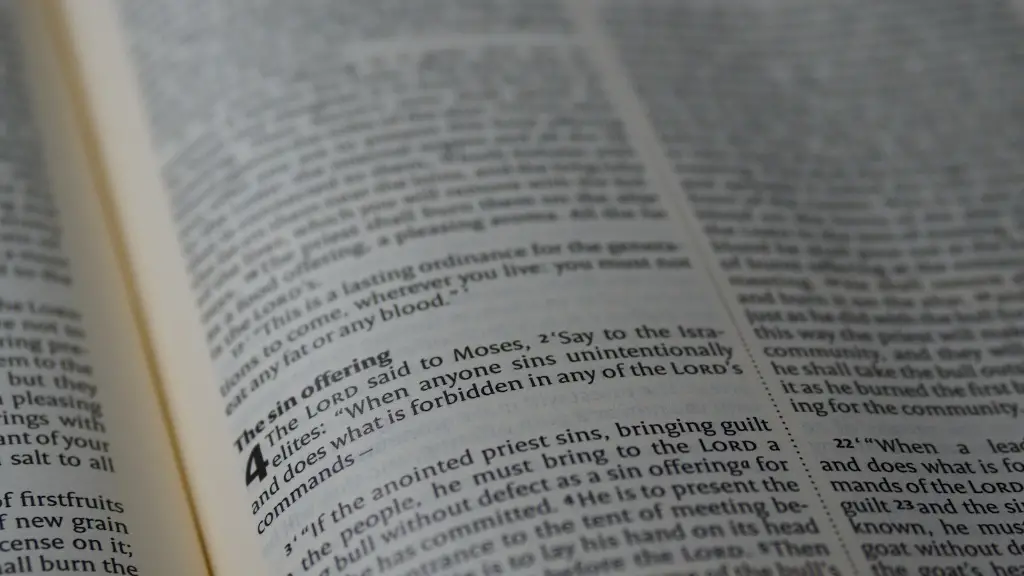The Bible and the Presence of Haters
The Bible is a divine source of spiritual knowledge, guidance, comfort and support. It is essentially a repository of wisdom, which can be interpreted in myriad ways as it is composed of parables, stories and lessons which on the surface appear to be archaic but in essence are timeless wisdom.
The text contains references to a range of topics, such as revenge, justice and love, which allude to the presence and prevalence of negativity, particularly in the form of haters. In the Bible, haters are often defined as those who have malicious intentions and are trying to sow discord or disharmony in the lives of others.
For example, in the book of Proverbs, it states, “Shun evil and do good; seek peace and pursue it.” This implies that people should avoid engaging with those who seek to spread malicious gossip or engage in manipulative actions.
In Matthew 5:44-45, it states “love your enemies and do good to them…” which suggests that we should not only strive to forgive those who have wronged us but we should also offer them compassion and kindness.
Furthermore, Romans 12:17-21 further speaks to the power of kindness and charity in the face of adversity as it serves as an antidote to the hostility of haters. Apostle Paul’s words in the message of Romans clearly indicate that “to be overcome with evil means to overcome evil with good.”
Ultimately, the Bible is a source of moral and spiritual guidance. Its teachings act as a reminder that, in spite of the presence of those who wish us harm, we should continue to live each day with love, compassion and humility.
Responding to Hate
While the Bible does not explicitly provide people with instruction on how to handle hate, its messages do provide insight into how one can respond to it.
The concept of retaliation is perhaps the most prominent feature of hate. People often attempt to retaliate by acting out of anger, lashing out and seeking revenge. Yet, retaliating with more hate only serves to perpetuate the cycle of hate and violence.
While it is impossible and even irresponsible to suggest that one should overlook or ignore prejudice and injustice, the Bible provides a more constructive approach to responding to hate and hate-based comments.
Christ calls upon us to engage in peaceable, compassionate solutions and practices, rather than perpetuate the negative cycle of retribution. In the book of Matthew, Christ encourages us to “bless those who curse you, do good to those who hate you, and pray for those who mistreat you.”
Rather than responding to hate with hate, Christ’s commandment offers a profound alternative; choosing, instead, to respond with kindness and understanding. In doing so, we can draw from the divine power and wisdom of God to create a better, more peaceful world.
Engaging in these practices will not only provide us with a spiritual anchor in the face of hate, but it can also potentially help break the cycle of conflict and hatred.
The Power of Love and Forgiveness
The Bible is a remarkable source of spiritual guidance and, through its teaching, teaches people to love and forgive rather than to hate. Indeed, the power of love has been recognised throughout religious texts, from Biblical times to the present day.
According to the Bible, even in the face of hate and hurt, we must learn to forgive and trust in God’s will and in His power to protect us and to heal us. Even in the most difficult of circumstances, we can learn to overcome our bitterness and anger by cultivating patience and kindness.
In addition, the Bible calls upon us to forgive those who have wronged us. It states, “forgive, and you will be forgiven.” Forgiveness might not necessarily be easy, but it is a necessary and essential component of personal growth. Only by embracing forgiveness can we transcend the hurt and negativity caused by haters.
When we let go of our anger and resentment, we can surrender to the peace and comfort that only faith can provide. This is what allows us to make sense of the pain inflicted on us by haters, and to strive forward despite the darkness and despair they bring into our lives.
Learning to Live Above Hate
The Bible is a source of deep comfort as in it dwells the promise of miracles and hope. It teaches us to be part of a larger movement of human beings, who live with faith and trust that good will eventually prevail over evil.
The Christian moral scriptures teach us to love in spite of hate, to forgive and to allow our compassion to shine in the face of darkness. We are encouraged to remember our higher purpose, and to act in accordance with divine will even in the presence of hatred and hostility.
Though the purpose of our lives can sometimes become lost in the shadows, the power to live and create our own peace will never be extinguished. As such, the Bible’s powerful messages of love and forgiveness have the capacity to provide us with a sense of inner comfort and strength, to make sense of the pain inflicted on us by those who hate.
The Power of Prayer
The Bible is a powerful source of spiritual guidance and one of the most useful tools for dealing with the presence of hate. Prayer has the potential to bring us closer to God, allowing us to open our hearts to His love and His will.
Prayer is a powerful tool, which provides us with strength and peace in the face of hurt, prejudice and hatred. It can provide a sense of solace and inner power in the midst of chaos, and it can also create feelings of unity and connectedness, as we come together to pray for peace and harmony.
In addition to prayer, the Bible encourages us to engage in charitable activities and to participate in acts of kindness, compassion and understanding. Though we might encounter prejudice in the world we live in, we can draw on the spiritual power of God to lead us to the peace and light we seek.
Finally, the Bible is a source of strength and hope. By coming together in prayer and practicing acts of love, compassion and charity, we can open our hearts to God’s will, allowing us to rise above hate and find Divine purpose.
The Power of Faith and Action
The power to overcome hate is rooted in faith and the pursuit of justice. Hate can be a powerful and destructive force, but with faith and courage, we can overcome it.
The Bible encourages us to believe in ourselves, to recognize our unique abilities and strengths, and to use this as a source of courage in order to take action. We should also strive to advocate for justice and promote understanding and compassion in the face of hate.
In addition, we can use our faith in God as a source of courage and strength to help us stay strong in the face of hate. By connecting with the divine power of God, we can use our faith to remain steadfast in our pursuit of justice and respect, even when faced with hostility and animosity.
Similarly, we can draw upon the power of God to help us to forgive. By understanding that only then, can we transcend the pain inflicted by those who hate us, and turn our attention, instead, to the beautiful fabric of life and our spiritual journey ahead.
The Power of Exemplifying Love
The message of the Bible serves to remind us that, no matter the intensity of the hate that we may encounter, we can always transform it into a source of love and comfort. It is through this transformation that we can unlock the inner power of God, which can help us rise above the fear, the pain and the hate inflicted upon us.
The Bible encourages us to use our faith and our power of love to reach out to those who hate us, and to seek to understand our enemies. We should strive to view them from a place of love and compassion, rather than from a place of judgement and condemnation.
We can also use our love to bring about healing and transformation to our communities. We can use our spiritual power to bridge divisions, build understanding and promote peace and justice. By coming together in love and empathy for one another, we can celebrate our differences and reclaim the inner sense of unity we all share.
By looking to the teachings of the Bible, we can draw upon its wisdom to transcend hatred and find peace and hope. The Bible is ultimately a source of divine power and purpose that can guide us in our pursuit of love, justice and peace.





